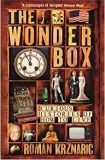The Wonderbox: Curious Histories of How to Live by Roman Krznaric
| The Wonderbox: Curious Histories of How to Live by Roman Krznaric | |
|
| |
| Category: History | |
| Reviewer: Clare Reddaway | |
| Summary: Using history to answer the ancient question ‘how should we live’, Roman Krznaric’s fascinating book is both erudite and readable. A delight. | |
| Buy? Yes | Borrow? Yes |
| Pages: 356 | Date: December 2011 |
| Publisher: Profile Books | |
| External links: Author's website | |
| ISBN: 978-1846683930 | |
|
| |
How should we live? asks author Roman Krznaric. To answer this ancient question, he looks to history. 'I believe that the future of the art of living can be found by gazing into the past', he says. Creating a book which is as full of curiosities as a Renaissance 'Wunderkammer', he has a stab at the big questions: love, belief, money, family, death. The result is a pot-pourri of delights which left this particular reader stimulated and invigorated.
Krznaric approaches each topic head on, examining how we live our lives now and selecting a number of people or periods from the past to illustrate how things were different and could be again. So, for instance, when he writes about love he criticises the barren crudeness of the single word ‘love’ which we now use to express every aspect of the emotion. He contrasts us with the Greeks who distinguished between six different types of love, from ‘eros’ (the passionate loss of control we might call ‘madly in love’) to ‘philia’ (the love between friends) or ‘pragma’ (the mature love of a long-term relationship). Today’s obsessive search for the ‘soul mate’, perpetuated by the media and Hollywood, places, he claims, undue pressure on one person to fulfil all the different aspects of love.
The choice of characters that Krznaric makes to illustrate his points is one of the most interesting aspects of the book. Some of them are well known to everyone – Helen Keller, for instance, or George Orwell. Some are less well known, at least to me. He illustrates his chapter on empathy with a former Ku Klux Klan leader, C.P. Ellis, and a black civil rights campaigner Ann Atwater. He writes as easily about 18th century Quaker John Woolman, 17th century Matsuo Basho, a Japanese pilgrim and the French high-wire artist Philippe Petit, who is still alive. He draws word-portraits of his subjects which illuminate their lives for the reader.
Equally, the choice of topics is excellent. There are the chapters that I have mentioned, but he also explores less obvious areas of contemporary life. I was particularly taken with his chapter on senses, in which he claims that we now occupy a hyper-visual society, with an over-reliance on our sight as the preferred medium for filtering our perceptions of the world. He explores why we refer to having five senses, illustrating how this came about and questioning whether five is too restrictive. I found this to be intriguing and made me look at an everyday aspect of life in a truly new way.
For me, a less successful aspect of the book is when Krznaric suggests how to implement in our own lives the historical truths he has uncovered. He has a definite agenda for how life should be lived but his suggestions can come over as rather simplistic and trite. So he writes ‘we are constantly rushing to save time but there are no banks in which to deposit our savings.’ He urges us to spend more time in nature, with our families, particularly elderly parents and suggests that we should follow our passions – all of which would appear to be no-brainers. Television, cities and the stresses of work are the new evils that we must overthrow. Whilst some of his thoughts are innovative, others are obvious, and part of a stream of lifestyle advice that appears all too frequently in magazines and newspapers.
However, that apart, the range and breadth of learning on display in this book is combined with a chatty style which makes it an easy and delightful read. Krznaric has a genuine skill in examining aspects of life that most people take for granted and he can make the reader look at them again from a new and fresh angle. His findings are often highly illuminating. Finally, I would have to thank anyone who introduced me to the blissful Greek verb ‘katapepaiderastekanai’ which means ‘to have squandered an estate through hopeless devotion to boys’.
If this book appeals then you might like to try On Kindness by Adam Phillips and Barbara Taylor or The Happy Life: The Search for Contentment in the Modern World by David Malouf.
Please share on: ![]() Facebook,
Facebook, ![]() Twitter and
Twitter and
![]() Instagram
Instagram
![]() You can read more book reviews or buy The Wonderbox: Curious Histories of How to Live by Roman Krznaric at Amazon.co.uk Amazon currently charges £2.99 for standard delivery for orders under £20, over which delivery is free.
You can read more book reviews or buy The Wonderbox: Curious Histories of How to Live by Roman Krznaric at Amazon.co.uk Amazon currently charges £2.99 for standard delivery for orders under £20, over which delivery is free.
![]() You can read more book reviews or buy The Wonderbox: Curious Histories of How to Live by Roman Krznaric at Amazon.com.
You can read more book reviews or buy The Wonderbox: Curious Histories of How to Live by Roman Krznaric at Amazon.com.
Comments
Like to comment on this review?
Just send us an email and we'll put the best up on the site.


